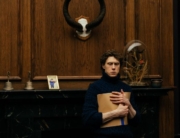![]() Though there are many themes brought to the forefront in Gabrielle, the unique power of music is what stands out. Gabrielle is a 22- year-old woman with Williams syndrome, a genetic condition typically characterized by cardiovascular disease, developmental delays, and learning disabilities, concurrently with exceptional verbal skills, sociability, and a fondness for music. She searches for some manner of independence even though she realizes she must rely on constant help and attention. Through her love of singing, she finds escape. Played by Gabrielle Marion-Rivard, who has Williams syndrome, Gabrielle is thoughtfully brought to life in a film which tells a heartwarming, but not overly sentimental, story of love.
Though there are many themes brought to the forefront in Gabrielle, the unique power of music is what stands out. Gabrielle is a 22- year-old woman with Williams syndrome, a genetic condition typically characterized by cardiovascular disease, developmental delays, and learning disabilities, concurrently with exceptional verbal skills, sociability, and a fondness for music. She searches for some manner of independence even though she realizes she must rely on constant help and attention. Through her love of singing, she finds escape. Played by Gabrielle Marion-Rivard, who has Williams syndrome, Gabrielle is thoughtfully brought to life in a film which tells a heartwarming, but not overly sentimental, story of love.
Gabrielle is part of a Montreal choir of developmentally disabled singers called the Muses. They are set to perform on stage with the famous singer Robert Charlebois (playing himself). Gabrielle’s love of music is evident, and it’s through the choir that she meets fellow performer Martin (Alexandre Landry). She and Martin strike up a relationship, and very quickly it becomes physical. Martin’s mother (Marie Gignac) is uncomfortable with the situation and he and Gabrielle are promptly separated.
Desperate to find a way to keep seeing Martin, Gabrielle believes independence, specifically her own apartment, will bring him back. She looks to her sister, Sophie (Mélissa Désormeaux-Poulin), who wishes Gabrielle has more autonomy as well. Sophie deals with her own dilemma, as her boyfriend, Raphael (Sébastien Ricard), is teaching music in India and he desperately wants her to join him. She fears leaving Gabrielle, as her attempts at independence constantly prove that she needs to be looked after.
As previously stated, what stands out about Gabrielle is its use of music. Charlebois’s songs are used throughout, and scenes of the choir practicing are lovely. Their passion for music is so clearly visible. Likewise, when Gabrielle runs away from her home, a cover of Iggy Pop’s song “The Passenger” is played and makes the scene perhaps the most memorable. Gabrielle’s family is very musical: Sophie was a music teacher, and her mother works at the symphony. Music becomes the unifying theme.
Gabrielle was submitted as the Canadian entry for the best foreign language film at this past year’s Academy Awards. It’s not surprising it has been up for honors considering its subject matter, but Gabrielle has an aura that transcends the formulaic overcoming-a-disability narrative. It has sincerity. Marion-Rivard is wonderful throughout, as is all the supporting cast, especially Désormeaux-Poulin as a sister dealing with guilt and uncertainty. It is a simple story, but with very complicated issues at its heart.
As Gabrielle leads to the big performance at the end, I got swept up in the emotion of it all, but never once felt manipulated. Director Louise Archambault lets the characters shine, calling attention to the reality of such a situation, but also to the kindness of a community. Gabrielle and Martin’s love story may be at the center, but there is love to be found in every character.







Leave A Comment